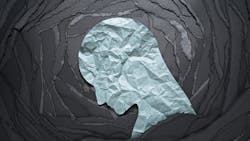Is it just me, or is practicing dentistry more difficult than ever?
Navigating the past 36 months of COVID-era dentistry has been the toughest challenge of my career. Between the dramatic shutdown to deciphering the PPP to the restart to managing team and patient safety, this has been a wild ride for us all. I am not ashamed to say that my already fragile mental health has taken a hit.
I say “already fragile” because even before COVID, I knew that dentistry was taking a toll on me; the stress of the profession had worn down my previous exuberance before I ever heard the word “COVID.” I first noticed the effects around 2017. It started with what seemed to be decreased patience for patients and team members, which evolved into anxiety, panic, and depressive episodes. I started toying with the idea of seeking some professional help.
The turning point
One morning in early 2018, I arrived at my office early and checked the business email account. In it was an “exit interview” from a patient who indicated to my software that they were seeking dental care elsewhere. When asked for a reason, the patient noted that they switched dentists because “Dr. Austin just seems so angry all the time.” This cemented it; it made me realize I needed to get some help and talk to someone.
You might also want to read: Mental health matters: What to do when your employees aren't OK
I had never had any treatment like this, and I didn’t even know where to begin. So I started with what television and movies told me I should: a psychiatrist. After a couple of visits with her, she told me I didn’t need her. I was confused. “What do you mean, I don’t need you? I need a shrink, right?” She laughed and kindly put her hand on my arm and said, “I am a physician. I manage issues medically. I work as part of a multidisciplinary team. If I came to your office for a cleaning, would you do it?” I chuckled at that. “Absolutely not. At least not if you want it done well. You would see my dental hygienist for that,” I said.
She looked as if she already knew that she had won the debate. “Exactly,” she said. “You have auxiliaries who help you so you can practice at the top of your degree. We do the same thing here. Instead of dental hygienists, we have psychotherapists. Think of them as dental hygienists for your mind.”
It was with that conversation that I discovered that psychotherapy is essential for me to deal with the everyday stresses of dentistry and life. I started seeing a psychotherapist after and it has been a game-changer for me, both personally and professionally.
In this pandemic era, it’s much easier to have virtual meetings with a therapist, so there really is no excuse—you don’t even have to leave your office anymore.
The hardest part of therapy is finding someone who is right for you. I recommend starting with the “find a provider” tool on the American Academy of Marriage and Family Therapists website. You may need to find one licensed in your state, but if your visits are virtual, you don’t have to narrow down your search to just your immediate area. Read the providers’ philosophies, and look into a few who sound good to you. I chose a therapist who focuses on previous trauma, and she has been amazing.
Tools beyond therapy
There are tools in addition to therapy that can help us as dentists with our mental health. Meditation is a tremendous tool for calming the mind, reducing anxiety, and de-stressing. Even just a few minutes a day can have a huge impact. Meditation can be difficult, especially for those new to it like I was. I find guided meditation to be a big help. I use an app called Calm for at least 10 minutes a day, during my workday in my private office. It refocuses my mind and changes my outlook on the day. Ten short minutes is all it takes most days. You can afford that. We all can.
Therapy and meditation are key components for mental health. But despite our best efforts otherwise, musculoskeletal pain can negate the benefits. That’s why yoga can be so valuable for dentists. Yoga combines stretching and breathing exercises in a way that is very beneficial for our contorted, tied-in-knots bodies. My physical therapist, Dr. Sarah Eads at Method Wellness and Yoga, is also my yoga instructor. Her classes are rooted in ergonomics and science and don’t focus on the spiritual aspects of yoga you might be expecting. I actually look forward to my classes. If you practice dentistry, you should consider practicing yoga as well. Pain wreaks havoc on our mental health. You don’t need to live in pain. Physical therapy and yoga can get your body right so your mind can be right.
Sleep is the final piece of the puzzle after therapy, meditation, breathing, and yoga. It ties everything together. We all know about the dangers of sleep apnea; however, it doesn’t even need to be that severe for ill effects to manifest. Simply not enough or poor-quality sleep can be detrimental to both our mental and physical well-being.
Practice sound sleep hygiene. Get a new adjustable bed. Visit with a sleep physician for a sleep study. If you don’t sleep well, you can’t be well. Sleep is the glue that holds all the other pieces together.
Dentistry is hard; it’s got to be one of the world’s most difficult professions. We deal with difficulties all day including team, patients, failure, and insurance. Each of these alone can take a toll on us, much less all of them combined. Unfortunately, we aren’t taught the importance of balance and mental health early on. This dearth of information starts in dental school and continues into our careers with continuing education requirements.
It is time that we as a profession raise our collective knowledge and acceptance of the idea that dentistry is hard on our mental health. It is OK to see a therapist. It is OK to meditate. It is OK to take yoga. It is OK to not be OK. You are not broken. We are in this together.
Editor's note: This article appeared in the May 2023 print edition of Dental Economics magazine. Dentists in North America are eligible for a complimentary print subscription. Sign up here.
About the Author
Joshua Austin, DDS, MAGD
Joshua Austin, DDS, MAGD, is a graduate and former faculty member of the University of Texas Health Science Center at San Antonio School of Dentistry. Author of Dental Economics’ Pearls for Your Practice column, Dr. Austin lectures nationally on products, dental technology, online reputation management, and social media. He maintains a full-time restorative dentistry private practice in San Antonio, Texas. You may contact Dr. Austin at [email protected].
Updated June 21, 2023

